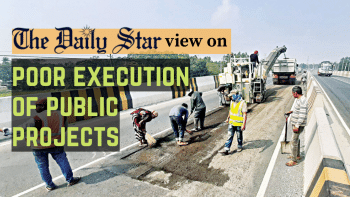Are public projects doomed to flounder?

Why do public projects flounder the way they do in Bangladesh? If there is one thing constant about the endless procession of projects being taken up in the service of "development", it is the air of inevitability about something always going wrong with them. Whether through collusion, or carelessness, or downright ineptitude, these projects are being undone by those involved in various stages starting from their conceptualisation to implementation. The most obvious outcome of this state of affairs is revision of projects – with deadlines extended, sometimes multiple times, and original costs pushed up several times higher – but rarely any punishment for the perennially underperforming project authorities.
Our report on a recent workshop, attended among others by the cabinet secretary and planning commission officials, brought out some of the most common irregularities in such public undertakings. For example, in case of foreign-aided projects, it is seen that the Economic Relations Division (ERD), which negotiates foreign loans on behalf of the government, fails to thrash out watertight contracts because of the lack of efficient human resources. In the absence of legal counsel well-versed in international contracts, sometimes clauses are slipped in that are not in Bangladesh's favour or in compliance with the International Federation of Consulting Engineers (FIDIC) rules. Such unfavourable clauses may include a foreign lender doing the feasibility study or drawing up the design itself, or the contractor and the consultant being the same, etc. All are in violation of the FIDIC rules.
As well as robust contracts and feasibility studies, avoiding conflicts of interest at any stage of a project is also a fundamental requirement. That goes for locally funded projects as well, where, unfortunately, the rules are more often breached than honoured. Lack of open tender and competitive bidding remains a constant threat. Often, the project implementing agency and line ministries lack ownership and even knowledge of relevant development project proposals (DPPs), leading to all sorts of problems including project revisions. Sometimes the pressure for revisions comes from the contractors, who exploit their connections to profit off any cost overrun. In short, there is no shortage of challenges or loopholes allowing corruption and mismanagement in the government's construction projects.
These long-festering problems have frequently come in the way of such projects over the last decade or so, delaying many of them or, in worst-case scenarios, halting them in their tracks. In the end, poorly planned and executed projects make poor investment returns. And it is the taxpayers who have to suffer the most as a result, firstly because of the overspending, the burden of which ultimately falls on their shoulders, and then because of their lower-than-expected results post-completion. We, therefore, urge the government to critically rethink its project management strategy. It must reform how its projects are designed and implemented from start to finish.


 For all latest news, follow The Daily Star's Google News channel.
For all latest news, follow The Daily Star's Google News channel. 








Comments